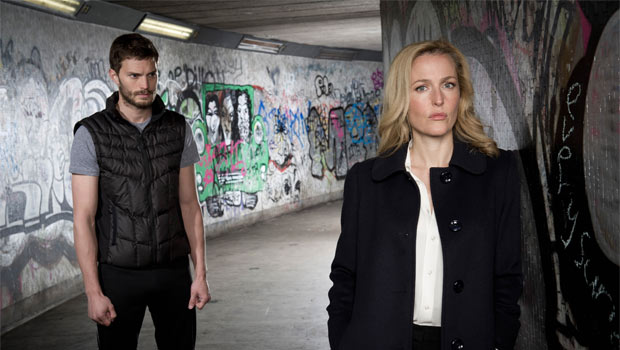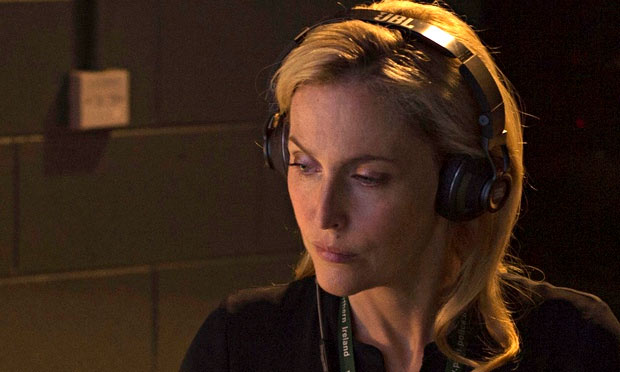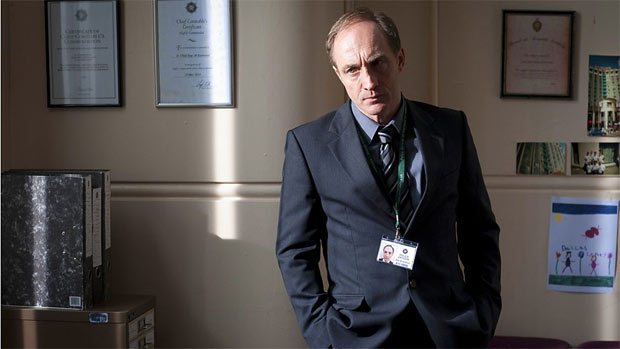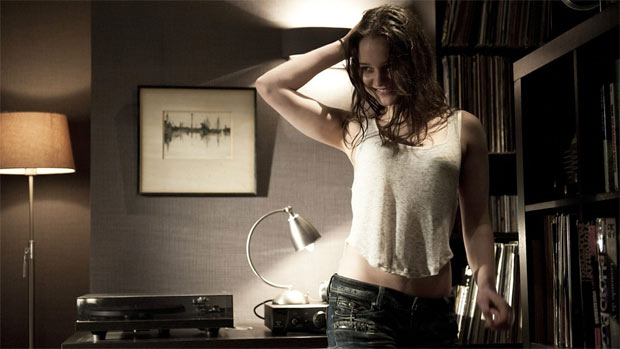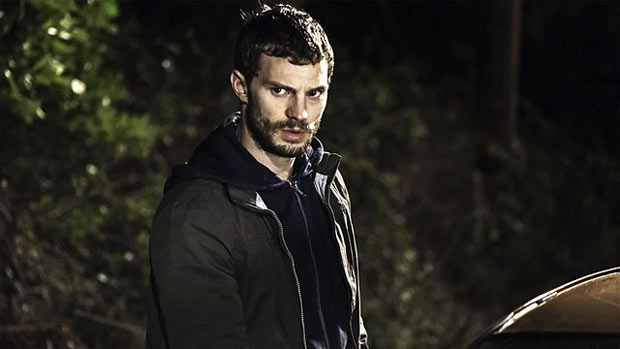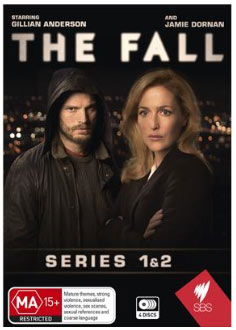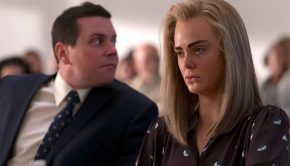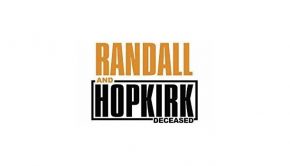The Fall Series 1 & 2 DVD Review
Summary: Compelling, honest and overwhelmingly sympathetic, The Fall is must watch television
4.9
Gripping
The Fall Series 1 & 2
Actors – Gillian Anderson/Jamie Dornan
Film Genre – TV Drama
Label – SBS
Audio – English (Dobly Digital 2.0)
Aspect Ratio – 1.78:1
Region Coding – 4
TV Standard – PAL
Rating – MA15+
Year of Release – 2013
Primary Format – Movies/TV – DVD
Reviewer – Robert Mammone
Paul Dornan (Fifty Shades of Grey) plays Paul Spector, a grievance counsellor with a young family who has begun murdering young professional women in Belfast. A taskforce is set up by ACC Jim Burns (John Lynch), who appoints Det. Superintendent Stella Gibson (Gillian Anderson) to head it.
Split over two series of eleven episodes, The Fall covers the entirety of the investigation, from the initial suspicions a serial killer is at work, to the powerful ending in the final episode. Far from being a straight procedural, the production team spend as much time depicting the chase as they do the interior lives and motivations of the lead actors, particularly Dornan and Anderson.
Unlike many other productions featuring serial killers, Alan Cubitt (who wrote all the episodes of both series) is unsparing in his depiction of the suffering inflicted on the victims and also their grieving friends and relatives. Too often, the serial killer in popular culture are raised to the level of a brooding genius, and the audience is implicitly invited to regard them on the same heroic level as people tasked with catching them. Here, Dornan is shown in both lights – a creature of supreme arrogance and icy intelligence, who tracks then hunts and tortures and kills his victims. The camera lingers, and while the audience might flinch, it doesn’t.
While Dornan is the motivating character in the series, its true centre lies with Gillian Anderson’s Stella Gibson. She is the viewpoint character, the person tasked with the audience’s unspoken expectation that she will capture and punish Spector. But she isn’t just another police officer. Like Anderson’s character Bedelia Du Maurier in Hannibal, there is an icy intelligence to Gibson that immediately sets her apart from the viewers. She is clearly sympathetic to the victims and their families, but with regards to her professional duties she effects a demeanour that appears haughty at first but may simply be a marker for a deeper personal trauma that requires her to be separate from those around her. There is also a sort of causal amorality to her, particularly in the depiction of her sexual relations with several of her colleagues, which still shocks in these more accepting times.
Aside from the leads, the writing in the series is top notch. Conceived by Allan Cubitt, who not only wrote all eleven episodes but also directed the entirety of series two, The Fall is the singular vision of one man. It is frequently dense and multi-layered, never pausing to give the audience time to come up to speed. Cubitt has created a world deeply imbedded in the religious and political divisions of Belfast and Northern Island, and a cast of characters similarly divided between the public lives, and personal sorrows.
The direction is filmic and as mentioned before, frequently unflinching. The first series is directed by Jakob Verbruggen (London Spy, The Bridge) and is a degree superior to Cubitt’s work in series two. There is a look and feel to the visual quality of the movie that is a world away from the standard point and shoot camera technique that still blights television.
In a series as sprawling as The Fall, the supporting cast is key to ensuring it all remains on track, and provides fodder for the sub-plots and motivations that inform the leads and the overall story. There are several supporting actors worth pointing out. Assistant Chief Constable Jim Burns (John Lynch), who appointed Gibson to head the review of the investigation, and later the investigation itself, is an interesting character. A former lover of Gibson who can’t let go of that interlude in his life, he has to carefully balance the investigation against a number of expectations, fiscal and political. His religion takes him on an interesting diversion to interview a defrocked, imprisoned paedophile priest who may hold the key to the identity of the killer. The scene allows Lynch some strong moments of disgust and denunciation.
Spector’s wife, Sally Ann (Bronagh Waugh) plays her hapless character in a manner designed to invite scorn and sympathy in equal measure. How could a wife not know her husband’s nocturnal activities weren’t something more than volunteering on a suicide line? How could she not know his true nature after a marriage and two children? At some point in the series, the viewer is invited to consider whether she is stupid, wilfully blind, or simply unable to comprehend the idea that her husband glories in killing younger, prettier women than herself.
Special mention must go to Aisling Franciosi who plays fifteen year old Katie Benedetto, the Spector’s children babysitter. While Spector’s killings maybe prosaic in their nature, in the sense that death is all around us, the depiction of Benedetto as a Lolita sexually attracted to someone she knows is a murderer is deeply troubling. Aside from the character’s age, her willingness to protect Spector by lying to the police flies in the face of all we think we know about teenage girls. Franciosi skilfully moves her character from naivety to something more sinister, and leaves the audience despairing at the end.
Both series of The Fall are excellent examples of the golden age of television we are currently experiencing. It benefits from the limited run of episodes in each series, but even moreso from stellar central performances from both leads. The writing never fails to engage, and while the subject matter is confronting and dark in many places, it is never needlessly gratuitous. At times, the viewer will want to look away, but the dark glamour of what is on the screen will often compel them to witness the carnage and horror depicted in all its terrible glory.
Overall
Part horror show, part suspense thriller, part police procedural and part human drama, The Fall can be considered the breakthrough moment when television finally eclipsed movies as the exemplars of a medium that cuts straight the heart of the human condition. Compelling, honest and overwhelmingly sympathetic, The Fall is must watch television. 5/5
Visuals: 5/5 – the camera fairly prowls through the mean streets of Belfast, depicting its urban decay with the same sensitivity and attention to detail during Spector’s depraved killings. The tone is gloomy, the sky always seems to be overcast, and the shadows and darkness are menacing.
Audio: 5/5 – on your reviewer’s set up, the audio was crisp and clean, which is greatly appreciated as an aid to understanding what is going on during the story.
Extras: Behind the Scenes featurettes for both series interview cast and crew about the experiences making the show. There’s nothing here you wouldn’t get in a press interview, but always interesting to see them all outside the fiction of the series itself. 3/5


